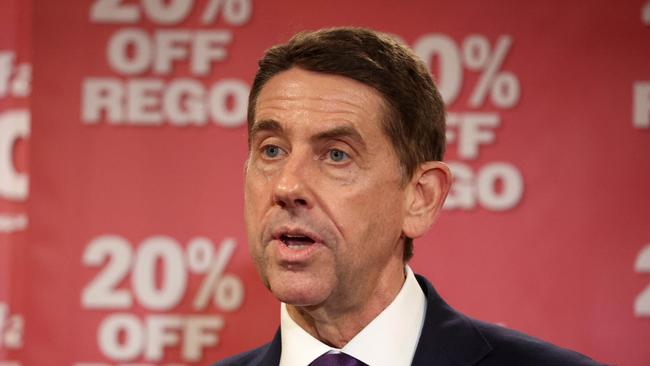Queensland’s record $172bn debt to fund renewable projects
The Miles Labor government will push Queensland into record debt of $172bn to fund the coal-rich state’s transition to renewable power.

The Miles Labor government will push Queensland into record debt of $172bn to fund the coal-rich state’s transition to renewable power, despite the centrepiece of the planned low emissions electricity network yet to receive approval.
New Treasury forecasts, to be released in Tuesday’s budget, reveal that total government debt will rise $70bn from mid-2023 to the end of the 2027-28 financial year.
The mounting debt, which Treasurer Cameron Dick says is needed to fund the phase-out of the state’s coal-fired power generators and manage population growth, is forecast to carry an annual interest rate bill of $4.76bn within the next four years.
Mr Dick on Monday moved to claim credit for “careful management”, saying the government had cut debt levels by $17bn in the two months ahead of the delivery of Labor’s last budget before it faces voters on October 26.
In April, Mr Dick said Treasury had forecast total debt would reach $188bn by mid-2028.
A spokesman for Mr Dick said debt had been revised down because of “careful management of proposed expenditure through the budget submission process”.
Tuesday’s budget will still include several unprecedented pre-election handouts to win back voters ahead of the election, including a $1000 energy rebate, slashed public transport fares, a 20 per cent discount on car registration fees and an increase to the stamp duty concession threshold for first-home buyers.
Mr Dick told a meeting of Labor’s 51-member caucus on Monday afternoon that the budget would not just help the vulnerable and struggling but “every Queenslander”.
“Tomorrow I will deliver the greatest cost-of-living relief budget in Queensland history and not only will it be the greatest cost-of-living budget in Queensland history, it will be the greatest cost-of-living budget that any state government has ever done in Australia,” he said.
“Because it doesn’t matter where you live … everyone is feeling national and global cost-of-living pressures and Queenslanders deserve a break.”
The surging debt levels comes at a time when the state coffers have been boosted by Labor’s super profit tax on coalmining companies.
In a December budget update, Treasury predicted coal royalties would add $9.2bn to government coffers this year, but the Queensland Resources Council believes this was an “underestimate”.
“Using recent price forecasts from McCloskey and holding all other Treasury assumptions constant, QRC modelling suggests coal royalties are likely to reach approximately $12bn this financial year,” it said.
Tuesday’s budget will reveal a predicted deficit of $2.2bn this financial year is now an estimated actual surplus of $564m, attributed to higher than expected revenue from royalties and taxes.
On the government’s preferred measure of net debt – which excludes debt carried by government-owned corporations – borrowings are now expected to reach $59.8bn by mid-2028, $13.2bn less than predicted in April.
The growing interest bill on debt – $1.91bn this financial year, surging to a projected $4.76bn in 2027-28 – is a drain on a budget struggling to accommodate record spending.
Costs will be partially offset by interest earnings, with net interest expenses forecast to be $1.26bn by mid-2028.
A large portion of debt is being used to pay for the state’s $107bn capital works program – and its blowouts – including new renewable energy projects.
Spending on the energy transition will rise by $7bn in the next four years, to a total of $26bn.
Tuesday’s budget will include just a fraction of the expected cost to build the Pioneer-Burdekin, touted to be the biggest pumped hydro scheme in the world.
The Miles government is relying on the proposed Pioneer-Burdekin Pumped Hydro project to enable it to shut down the state’s five coal-fired power stations, reach its target of 80 per cent renewable energy and slash emissions by 75 per cent by 2035.
The project, slated near Mackay, is still being subjected to financial, engineering and environmental investigations and is yet to get government approvals or substantive funding.
Initial estimates put the project at $12bn but Mr Miles has conceded that figure would likely balloon because of high construction costs.
Tuesday’s budget will include $1bn in the capital statement to fund land acquisitions and early works for Pioneer-Burdekin.
The state had planned to make a final investment decision on the project by mid-2024, but the detailed analytic report has been delayed until after the election.
Geotechnical drilling is still under way to shore up the viability of the project.
Mr Miles told caucus on Monday that his first budget as Premier would give future generations something to be proud of.







To join the conversation, please log in. Don't have an account? Register
Join the conversation, you are commenting as Logout